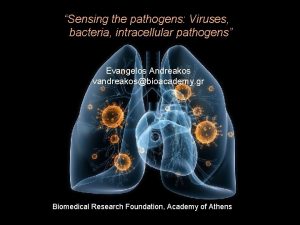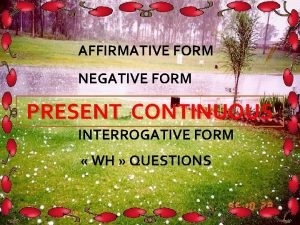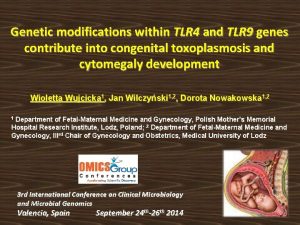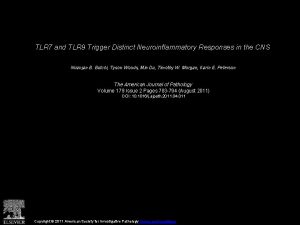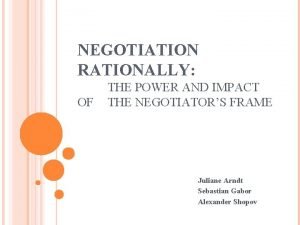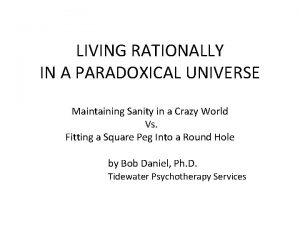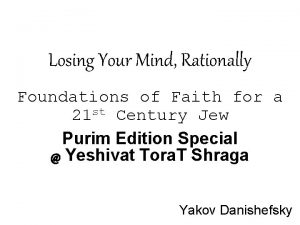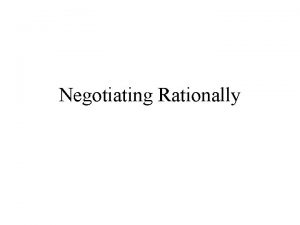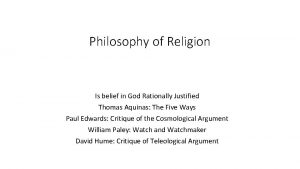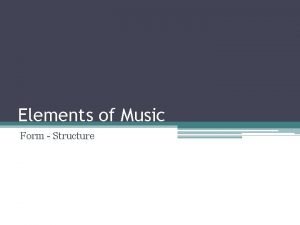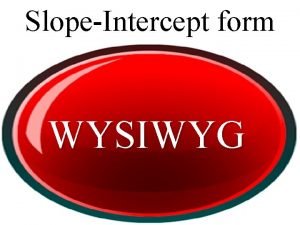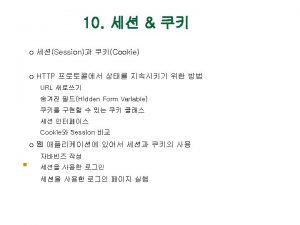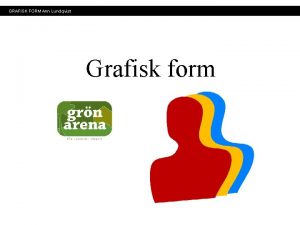A Rationally Designed Form of The TLR 5


















- Slides: 18

A Rationally Designed Form of The TLR 5 Agonist, Flagellin, Supports Superior Immunogenicity of Influenza B Globular Head Vaccines Langzhou Song Vax. Innate Corporation September 26, 2014

Vax. Innate Influenza Vaccine Development 2 • Traditional flu vaccine contains three components: 1 H 1, 1 H 3 and 1 B • More recently quadrivalent flu vaccine was introduced to the market which includes 1 H 1, 1 H 3 and 2 Bs from both lineages (Yamagata and Victoria). • Vax. Innate has successfully developed flu A vaccines that include H 1, H 3 and H 5 subtypes which are immunogenic and safe in pre clinical animal models and in human clinical trials. However, influenza B vaccines based on the same vaccine formats are poor triggers of TLR 5 and consequently poorly immunogenic.

Vax. Innate’s HA Subunit Vaccines Development of Initial Vaccine Formats HA Globular Head D 0 D 0 D 1 D 2 D 3 HA Monomer C Term (Antigen Attached to C-terminus) R 3 (Antigen Replaces D 3 Domain) R 3. 2 x (2 Antigens Fused to Flagellin) The vaccine format, or point of attachment of the vaccine antigen to flagellin, can dramatically affect the immunogenicity and safety profile of the vaccine. 3

Rationale for Flu B vaccine Design 4 • A major difference between the influenza A and B globular head domains is their iso-electric points (p. Is), which for influenza B is among the highest (above 9. 0 for the HA 1 subunit) as compared to most influenza A HA 1 s. Flagellin, on the other hand, has p. I around 5. • We speculated that the positively charged influenza B HA heads might be interacting with the negatively charged flagellin at neutral p. H, thereby interfering with TLR 5 signaling and/or antigen presentation. • To test this, we introduced two negatively charged residues, to mitigate potential charge interactions, in the region linking HA to flagellin in the R 3 format. • We also generated a second construct in which the globular head was inserted into D 3 rather than fully replacing it, to form the D 3 Ins format. The latter design serves to move the globular head further away from the primary TLR 5 binding sites in D 1.

Design of Flu B Vaccines R 3 and D 3 Ins Format The vaccine format design aims to reduce charge-charge interactions between HA head and flagellin to facilitate antigen presentation and TLR 5 signaling. 5

Comparison of R 3 and D 3 Ins formats in Mice Neutralizing Antibody Responses (HAI) • BALB/c mice (6 per group) were immunized s. c. twice (3 weeks apart) with 6 mg of Flu B vaccines. • Sera were harvested two weeks post the booster and evaluated for HAI titers using ether extracted B/Wisconsin/01/2010 virus antigen. Titers of individual mice with GMTs are shown. HL 719 (R 3 B/WI, an R 3 format), HL 724 (R 3 B/WI, an R 3 with negative charges in the linker), HL 772 (D 3 Ins B/WI , a D 3 Ins format), F 147 buffer Introduction of the two negatively charged residues in the linking region of the R 3 construct modestly improved titers. The use of the D 3 Ins format provided the most significant improvement in HAI titers. 6

Flagellin function of the fusion vaccines TLR 5 Activity by In Vivo Cytokine Assay • BALB/c mice (n = 5) were immunized once (i. m. ), sera harvested 3 h later and evaluated for IL-6 and TNF levels using a mouse cytometric bead array (CBA) from BD Biosciences. • HL 185 (R 3 A/CA 07): positive control; HL 719, (R 3 format, B/WI), HL 724 (R 3 B/WI with negative charges in the linker) and HL 772 (D 3 Ins format, B/WI ). The results show that introduction of the two negatively charged residues provides an incremental improvement while movement of the globular head to the D 3 Ins position provides a distinct improvement in the TLR 5 activity, particularly as measured by IL-6 production 7

Antigenicity of HA in Fusion Vaccines Neutralizing Inhibition Assay (NIA) HL 724 (R 3 B/WI, an R 3 with negative charges in the linker), HL 772 (D 3 Ins B/WI , a D 3 Ins format) • NIA measures the ability of a vaccine candidate to bind and deplete neutralizing antibodies presented in the immune serum, thereby assessing the integrity of neutralizing epitopes on the flagellin-HA fusion immunogen. • The higher potency of the vaccine candidate, the greater the depletion of the neutralizing antibodies in the serum that allows the test virus to infect MDCK cells. The R 3 format and the D 3 Ins format compete equally well for binding to neutralizing antibodies in the hyper-immune serum indicating that the antigenicity of the HA head is unaltered across the different constructs. Thus the poor immunogenicity of the R 3 format of the B/Wisconsin vaccine likely relates primarily to impaired TLR 5 signaling activity 8

Insertion Points of Flu B Vaccine Variants D 3 Ins Format Optimization Various insertion points in D 3 and D 2 were tested. The D 3 Ins vaccines were found to outperform the D 2 Ins vaccine candidates. 9

Insertion Points of Flu B Vaccine Variants D 3 Ins Format Optimization Construct In Vivo TLR 5 Activity HL 772, D 3 I-o 1 High (IL-6), Moderate (TNF-a) HL 826, D 2 I-o 2 Low (IL-6), Inactive (TNF-a) HL 849, D 3 I-i 1 High (IL-6), Moderate (TNF-a) HL 827, D 2 I-o 3 Low (IL-6), Inactive (TNF-a) HL 848, D 3 I-s 1 Moderate (IL-6), Inactive (TNF-a), HL 850, D 2 I-i 1 Low (IL-6), Inactive (TNF-a) HL 888, D 3 I-o 2 Low (IL-6), Inactive (TNF-a) HL 892, D 2 I-i 2 Low (IL-6), Inactive (TNF-a) HL 825, D 2 I-o 1 Moderate (IL-6), Low (TNF-a) HL 828, D 1 I-o 1 Inactive (IL-6), Inactive (TNF-a) Various insertion points in D 3 and D 2 were tested. The D 3 Ins vaccines were found to outperform the D 2 Ins vaccine candidates. 10

Insertion Points of Flu B Vaccine Variants In Vivo TLR 5 Assay for the Representative Vaccine Variants D 3 Ins: HL 772 (D 3 I-o 1, B/WI) and HL 849 (D 3 I-i 1, B/WI) D 2 Ins: HL 850 (D 2 I-i 1, B/WI) Positive Control: HL 185 (R 3 A/CA 07) Various insertion points in D 3 and D 2 were tested. The D 3 Ins vaccines were found to outperform the D 2 Ins vaccine candidates. 11

Insertion Points of Insertion Variants Mouse Immunogenicity by HAI Various insertion points in D 3 and D 2 were tested. The D 3 Ins vaccines were found to outperform the D 2 Ins vaccine candidates. 12

Application of D 3 Ins Format to Both Flu B Lineages HAI Titers of Flu B Vaccines of Two Lineages Yamagata Lineage: B/Florida/4/2006 F 147: Formulation buffer HL 610 (R 3 B/FL, an R 3 with negative charges in the linker), HL 772 (D 3 Ins B/FL, a D 3 Ins format) Victoria Lineage: B/Bangladesh/5945/09 F 147: Formulation buffer; TIV, Fluzone positive control HL 742 (R 3 B/BD, an R 3 with negative charges in the linker), HL 787 (D 3 Ins B/BD, a D 3 Ins format) D 3 Ins format is applicable to both B lineages. 13

Immunogenicity and Efficacy of Flu B Vaccines Flu B Challenge Model (B/Sichuan/379/1999) • Flu B challenge mouse model using B/Sichuan/379/1999 (D 3 Ins B/SI, Yamagata lineage). • Groups of 10 BALB/c mice were immunized twice with 6 mg of a D 3 Ins format vaccine against the B/SI. • Sera were harvested two weeks post the booster dose and evaluated for HAI titers. A robust immune response was shown in all mice in the challenge model. 14

Immunogenicity and Efficacy of Flu B Vaccines Flu B Challenge Model (B/Sichuan/379/1999) Groups of 10 BALB/c mice were immunized s. c. with the indicated doses of D 3 Ins B/SI or F 147 formulation buffer on days 0 and 21. On day 42, mice were challenged i. n. with 5 LD 50 of B/SI, and monitored daily for mortality for 21 days and weight change for 14 days. Survival rates (A) and weights (mean percentage of initial weight) (B) are plotted. D 3 Ins vaccine of B/Sichuan/379/1999 is efficacious at a submicrogram dose. The efficacy results of D 3 Ins B/SI thus support the general suitability of D 3 Ins format for our influenza B vaccines. 15

Flagellin and TLR 5 (Yoon, et al. , Science 2012) X-Ray Crystal Structure of Flagellin and TLR 5 Complex The Flagellin/TLR 5 structure confirmed that all known agonist-activated TLR structures form a similar dimer organization, which brings their C-terminal regions into juxtaposition so that their intracellular TIR domains can initiate a signaling cascade. 16

Summary • We have developed an alternative vaccine format for influenza B vaccines for which the HA head is inserted into domain 3 of flagellin and we have confirmed the optimal insertion point within domain 3. • We have shown that the redesigned format maximizes TLR 5 signaling and immunogenicity for multiple influenza B strains. • Similar to the A strain vaccines, the Flu B vaccines are economically and efficiently produced in our standard prokaryotic system which therefore allows for time and cost efficient production of a multivalent seasonal product comprising A and B strains. 17

Acknowledgements • Vax. Innate: Molecular Biology and Protein Sciences; Process Development; Analytical Development; Virology and Immunology Departments. Especially, Dr. Lynda Tussey (VP, R&D), Dr. Ge Liu (Virology) and Dr. Scott Umlauf (Immunology). • Scripps Research Institute: Dr. Andrew Ward and Dr. Ian Wilson • This project has been funded in part with Federal funds from the Office of the Assistant Secretary for Preparedness and Response, Biomedical Advanced Research and Development Authority, Department of Health and Human Services, under Contract No. HHSO 100201100011 C and from Vax. Innate Corporation. 18
 The global capacity to act purposefully
The global capacity to act purposefully Tlr participant worksheet answers
Tlr participant worksheet answers Tlr certification saskatchewan
Tlr certification saskatchewan Ifnlr
Ifnlr Tlr
Tlr Present continuous tense interrogative
Present continuous tense interrogative Hát kết hợp bộ gõ cơ thể
Hát kết hợp bộ gõ cơ thể Bổ thể
Bổ thể Tỉ lệ cơ thể trẻ em
Tỉ lệ cơ thể trẻ em Voi kéo gỗ như thế nào
Voi kéo gỗ như thế nào Tư thế worm breton
Tư thế worm breton Chúa sống lại
Chúa sống lại Môn thể thao bắt đầu bằng từ chạy
Môn thể thao bắt đầu bằng từ chạy Thế nào là hệ số cao nhất
Thế nào là hệ số cao nhất Các châu lục và đại dương trên thế giới
Các châu lục và đại dương trên thế giới Công của trọng lực
Công của trọng lực Trời xanh đây là của chúng ta thể thơ
Trời xanh đây là của chúng ta thể thơ Mật thư anh em như thể tay chân
Mật thư anh em như thể tay chân



